This step by step diy project is about 10×12 attached pergola plans. Therefore, a simple patio cover with a 10 ft x 12 ft base can be built with basic tools and common materials. This patio is ideal for an outdoor furniture set and maybe a TV. Take a look over the rest of my woodworking plans, if you want to get more building inspiration.
All my woodworking plans come with 3D diagrams and step by step instructions. In addition, the plans include full Cut and Shopping lists. Remember that you need to read the local codes before starting the project. It is your responsibility to make adjustments and suit the legal requirements.
When buying the lumber, you should select the planks with great care, making sure they are straight and without any visible flaws (cracks, knots, twists, decay). Investing in cedar or other weather resistant lumber is a good idea, as it will pay off on the long run. Use a spirit level to plumb and align the components, before inserting the galvanized screws, otherwise the project won’t have a symmetrical look. If you have all the materials and tools required for the project, you could get the job done in about one weekend. See all my Premium Plans HERE.
Projects made from these plans
10×12 Attached Pergola Plans – PDF Download
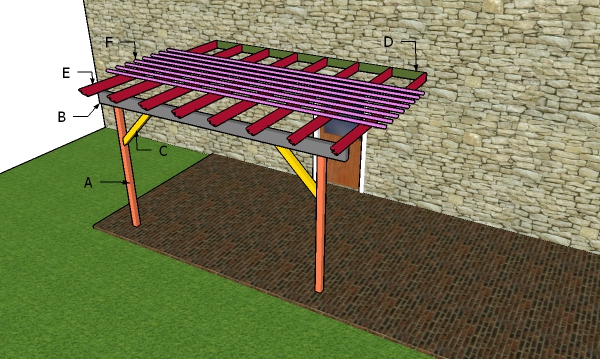
Building a 10×12 attached pergola
Cut + Shopping Lists
- A – 2 pieces of 4×4 lumber – 86″ long POSTS
- B – 1 piece of 4×8 lumber – 14′ long TOP BEAM
- C – 2 pieces of 4×4 lumber – 36″ long BRACES
- D – 1 piece of 2×8 lumber – 14′ long LEDGER
- E – 8 pieces of 2×8 lumber – 132″ long SHADE ELEMENTS
- E – 15 pieces of 2×2 umber – 16′ long TOP SLATS
- 3 pieces of 4×4 lumber – 8 ft
- 1 piece of 4×8 lumber – 14 ft
- 1 piece of 2×8 lumber – 14 ft
- 8 pieces of 2×8 lumber – 12 ft
- 15 pieces of 2×2 umber – 16′
- 8 pieces of 5 1/2″ screws
- 200 pieces of 2 1/2″ screws
- 2 pieces of 4×4 post anchor
- 8 pieces of rafter ties
- 8 pieces of rafter hangers
- 4 pieces of T ties
- 1 box of 1 1/2″ structural screws
- 1 box of 2 1/2″ structural screws
- lag screws (according to codes)
- 2 bags of concrete
- wood filler , wood glue, stain/paint
Tools
![]() Hammer, Tape measure, Framing square, Level
Hammer, Tape measure, Framing square, Level
![]() Miter saw, Drill machinery, Screwdriver, Sander
Miter saw, Drill machinery, Screwdriver, Sander
Time
Related
- Free pergola plans
- 12×24 Pergola plans
- 16×20 Pergola Plans
- Patio cover plans
- 12×16 attached pergola plans
Step 1: Laying out the posts for the pergola
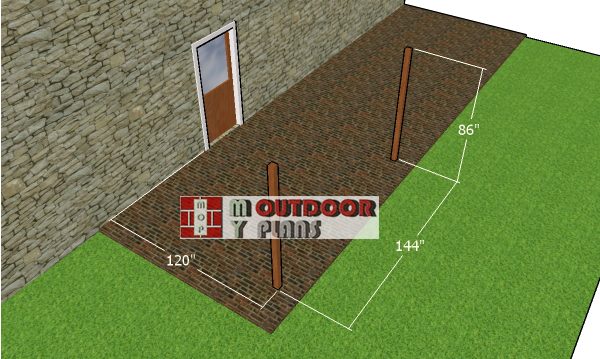
Laying-out-the-10×12-pergola
The first step of the pergola project is to layout the 4×4 posts. Use batter boards and string to layout the location of the posts. Apply the 3-4-5 rule to every corner and then measure the diagonals to make sure they are perfectly equal.
You need to make adjustments until you get the desired result. As you can see in the image, this pergola has a 10 ft x 12 ft base, outside post to outside post.
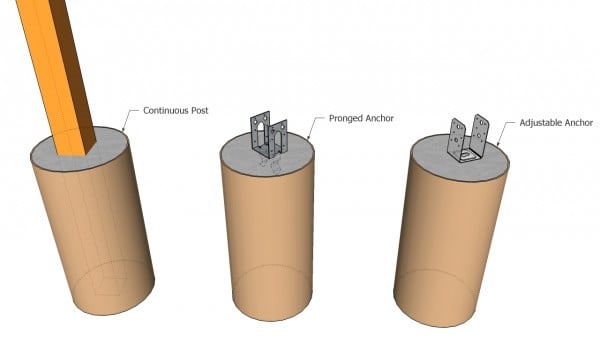
Anchoring the posts of the anchor
There are a few ways to secure the 4×4 wooden posts into place. You can set the posts in concrete or you can use adjustable anchors and pour footings. Dig the holes 3′ deep (or under the front line) and about 16″ in diameter. Compact a layer of gravel to the bottom of the holes and then fit the tube forms. Fit the posts, align them and plumb them with a spirit level. Fill the forms with concrete, while the posts are locked into place with temporarily braces. If you use anchors, you need to align and set them into concrete. Fit the posts after the concrete dries, using lag screw.
Smart tip: Read the local building codes, so you dig the holes at the appropriate depth. For this project, I will assume you will use post anchors, so if you set the posts into concrete, make sure you add 3′ to the posts size.
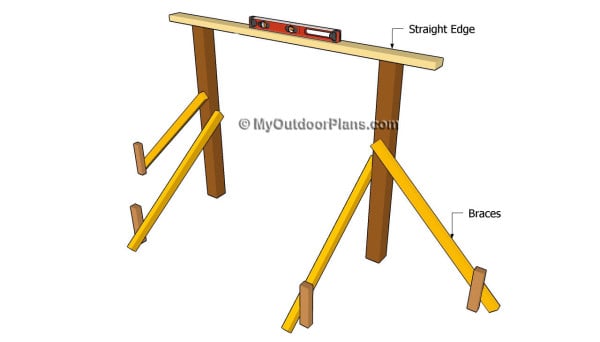
Installing the posts
Check if the posts are level and user a circular saw to make corrections. Notice the temporarily braces that hold the posts plumb. You need to keep the braces in place until you add the rafters to the pergola.
To determine the height of the posts, you need to secure the ledger to the house structure. The ledger will determine the height of the posts, because the first priority is to lock the ledger board to the rim joist of the house (see step 3).
Step 2: Fitting the support beam

Top-beam
Considering the 12 ft span between the posts, we need to use a 4×8 beam for the pergola. Set the beam to the top of the posts and make sure it has 12″ side overhangs. Use T ties and 2 1/2″ structural screws to lock the beam into place tightly. Ideally, attach the T ties on both sides of the joints.
Use a speed square to make sure the corners are right-angled. Use a spirit level to plumb the posts and to check if the beam is perfectly level.
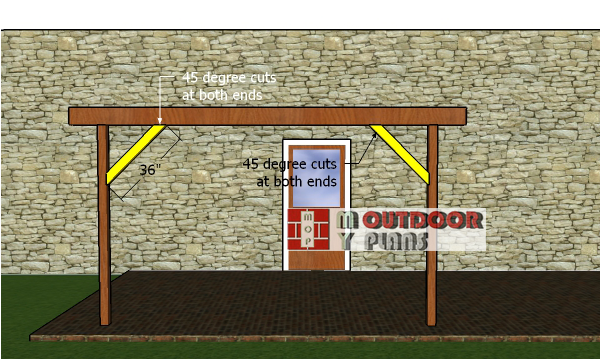
Fitting-the-braces—10×12-patio-cover
Use 4×4 lumber for the braces. Make 45 degree cuts at both ends of the braces. Fit the braces to the frame of the pergola. Drill pilot holes through the braces and insert 5 1/2″ screws to lock them into place tightly. Use at least 2 screws for each joint.
Step 3: Fitting the ledger board
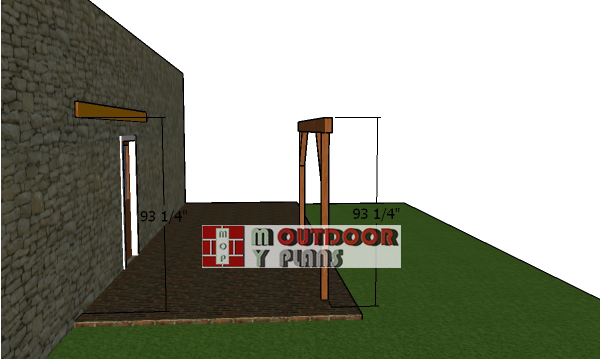
Ledger-board-height
We will use 2×8 lumber for the ledger. Secure the ledger to the house using the appropriate methods described by the local codes. Usually, it is done with lag screws that go directly into the rim joist or house joists. Use a spirit level to make sure the beam is horizontal.
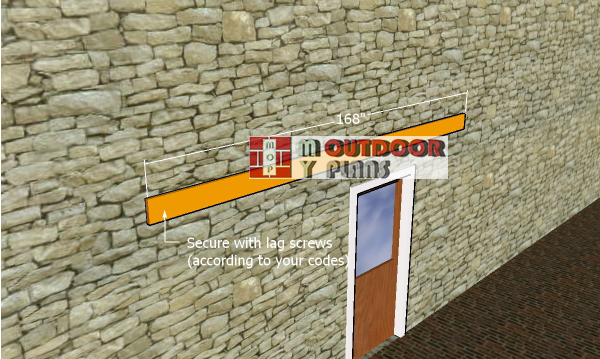
Fitting-the-ledger-board
Step 4: Fitting the pergola rafters
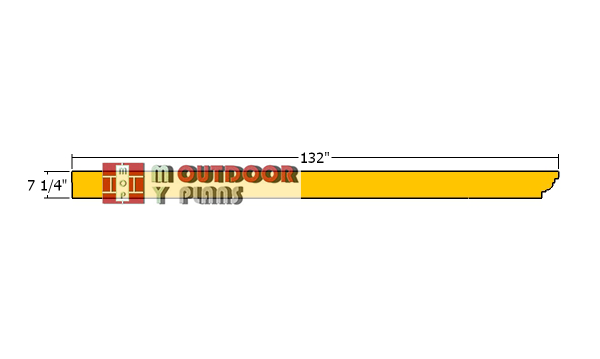
Rafters-for-attached-pergola

Decorative-ends-for-rafters
Next, we need to build the rafters for the pergola. 2×8 lumber is the best choice for this project, because it will reinforce the structure and add to the design. Use a jigsaw to make the decorative cuts to one end of the rafters. Mark the cut lines to the rafters and then get the job done with a jigsaw. Smooth the edges flush with sandpaper.
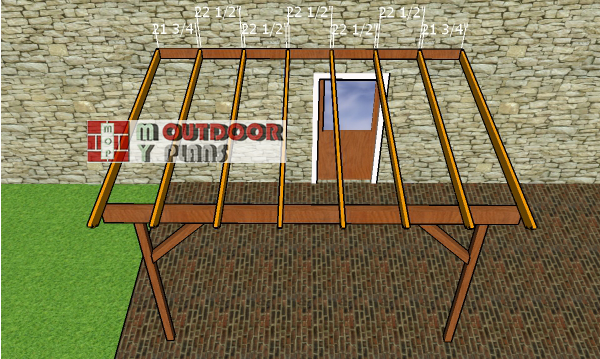
Spacing-the-rafters
Next, fit the rafters to the top of the support beams, every 24″ on center. Use rafter hangers and 1 1/2″ structural screws to lock the rafters to the ledger. In addition, use rafter ties and 1 1/2″ structural screws to lock the rafters to the support beams.
Step 5: Fitting the top slats
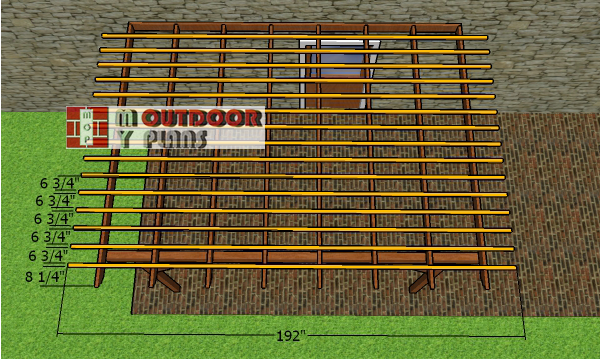
Fitting-the-top-slats
Furthermore, you need to take care of the finishing touches. Therefore, fit the 2×2 top slats to the pergola roof and lock it into place with 2 1/2″ screws. Drill pilot holes through the slats before inserting the screws, to prevent the wood from splitting.
The distance between the top slats determines the shade you get under the pergola. Therefore, the more slats you add the more shade you will have on the patio. Oppositely, if you want more sun on the patio, then you need to leave more space between the boards.
Step 6: Finishing touches
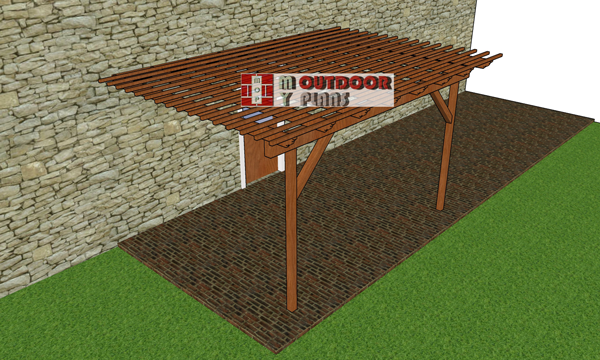
How-to-build-a-10×12-pergola-attached-to-the-house
Last but not least, fill the holes with wood putty and then smooth the surface with 120-220 grit sandpaper. Apply a few coats of paint or stain over the components, to enhance the look of the patio pergola and to protect the components from decay.

10×12-attached-pergola-plans—front-view
This is a super easy to build a attached pergola with a simple but distinctive look. The base of the pergola is 10 ft x 12 ft, while the roof is 11 ft x 16 ft.

10×12-attached-pergola-plans—front-view
This patio cover will create the much needed shade so you can enjoy your time in the fresh air, especially during the hot summer days.

10×12 attached pergola plans – dimensions
This pergola can be built by any person with basic woodworking skills and it is also very budget friendly. You can make a lot of adjustments to the design so it suits your tastes and needs. Check out the rest of my pergola plans, as I have many designs and sizes you can choose from.
In addition, I have over 1500 free woodworking plans on the blog, if you need more building inspiration. See HERE a list with all my free plans. If you want to get this plan as a PDF file, please take a look over the GET PDF PLANS button bellow. Thank you for the support.
This woodworking project was about 10×12 attached pergola plans free. If you want to see more outdoor plans, check out the rest of our step by step projects and follow the instructions to obtain a professional result.


2 comments
I enjoy looking at all of your plans especially the joinery. I do small craft type wood working and most of my own home repairs. Your site is very helpful and I appreciate and respect your work and ideas. Unfortunately I have tried to download a couple of the attached pergola plans but cannot seem to find a PDF download button. Can you help me,I have tried converting the plans into a PDF through I-books but only one page downloads. Thanks Leroy
Hi, I have a FAQ-PRINT button in the top menu. On mobile, use Start HERE button. You will find there a guide on how to get the plans